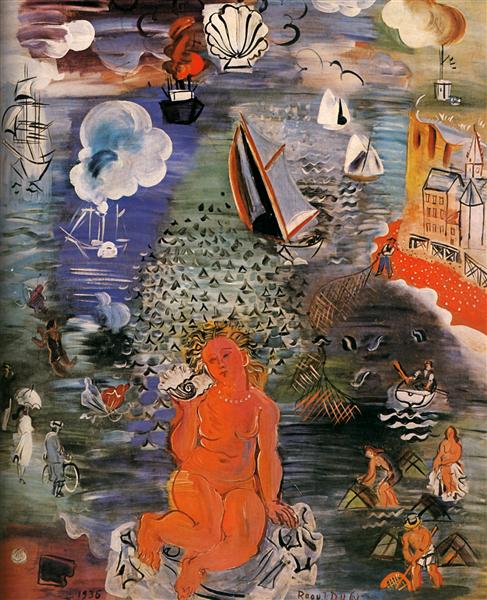Description
The work "hillow", carried out in 1936 by Raoul Dufy, evokes a subtle connection between classical mythology and modernity through its vibrant color palette and distinctive style. Dufy, a master of Fauvism and Modernism, uses in this painting a representation of host, the goddess of the sea in Greek mythology, to explore the relationship of the human being with nature, in particular, the vast and mysterious ocean.
The composition is characterized by a feeling of dynamism and fluidity. Dufy, known for his way of giving life to what he represents, manages to create an almost ethereal environment through the use of curved lines that suggest movement. In the work, the figures seem to be intertwined with the water, which enhances the idea of unity between the human being and the marine element. The host figure, which is located in the center of the piece, is presented in a stylized and elegant manner, with a pose that denotes grace and power, while around it various marine elements are displayed that account for their dominance over the ocean.
The choice of color is a fundamental aspect in "hillow". The vibrant palette combines tones of blue, green and golden touches that evoke the brightness of the water under sunlight and the reflection of the colors of the sea. This bold use of color not only emphasizes water energy, but also transmits a feeling of joy and vitality. Dufy, who was influenced by Fauvism, applies the color emotionally instead of representative, triggering an emotional response in the spectator that transcends the mere representation of the subject.
The details in the work, although simplified, still offer a waste of charm. The use of sinuous forms and the absence of rigorous realism are characteristics that allow Dufy to explore the essence of its subject rather than its appearance. In this sense, "host" can be seen as a dialogue between the known and the imagined, where what is presented is not so much a literal portrait of the deity, but a representation of the feelings and energy that she embodies.
Through his career, Dufy experimented with numerous themes and styles. His works often celebrate modernity and daily life, while at the same time pay tribute to tradition. "Hillow", in this sense, it is no exception, as it reflects its ability to mix classical mythology with a contemporary approach. It is also relevant to notice that Dufy was a pioneer in the use of watercolor in his work, a technique that seems to be shown with the almost liquid surface of the painting.
In summary, "hillow" is a work that, through its composition, use of color and representation of mythology, exemplifies Raoul Dufy's fauvist aesthetics. Painting is not only a testimony of his talent as an artist, but also a celebration of the link between the divine and nature, proposing a vision full of life and movement in an instant frozen by time. This approach makes the work an essential piece to understand the evolution of art in the first half of the twentieth century, and the search for new horizons that Dufy, with its characteristic style, managed to reach.
KUADROS ©, a famous paint on your wall.
Hand-made oil painting reproductions, with the quality of professional artists and the distinctive seal of KUADROS ©.
Art reproduction service with satisfaction guarantee. If you are not completely satisfied with the replica of your painting, we refund your money 100%.

